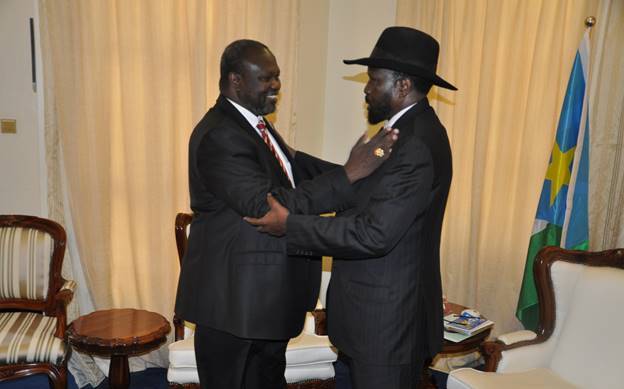It took time to convince world Machar is not for peace in S. Sudan: Kiir

August 26, 2017 (JUBA) – South Sudan President Salva Kiir Saturday said it took him time to convince regional and international leaders that Riek Machar is not a man of peace and that he should be kept away.
The former South Sudanese First President has been forced to live away from the country in South Africa where he is currently after the bloody clashes in July 2016 between his troops and the South Sudanese army forces loyal to President Kiir.
President Kiir says the rebel leader should not be personally involved in any peace process and his group be represented by any representative he designates. for his part, Machar wants to be allowed to return to South Sudan and his groups participates in the implementation of 2015 peace agreement not the splinter faction led by First Vice President Taban Deng Gai.
In a speech to members of the Jieng (Dinka) Council of elders who visited him at his residence, Saturday Kiir said he told regional leaders and the international community he was not worried about threats being posed to his presidency by his rival Riek Machar. However, he added, they were sceptical when he rejected calls to associate him with the implementation process of the peace agreement.
“The region has now realised the truth in what we have been telling them and the international community that Riek is not a democrat because democrats would not advocate war. But they did not seem to get us at first. They thought I was being personal. It took them time to realize and now they are the ones talking to him to denounce violence but what did he do? He refused,” said president Kiir.
The South Sudanese leader said he declared a unilateral ceasefire last May not because of regional and international pressure but to demonstrate his commitment to peace despite the fact that he was aware that Machar would not reciprocate.
“I told them in several fora that declaring unilateral ceasefire is a not a problem. We can do it like I have done it several times but it did not work because one side ceasefire does not hold. And whenever we declare a ceasefire, Riek and his group (would) take it as an advantage. That was why our forces have to go to Pagak and take it so that we see where they will come again,” said Kiir.
He stressed that IGAD leaders who decided his confinement in South Africa would not respond positively to his request to return to eastern Africa countries.
“The region will not allow return him if he does not denounce violence, which he will not do,” he said.
The delegation of the Jieng (Dinka) Council of elders visited President Kiir at his residence in Juba to extend him thanks and appreciations on behalf of the family members of former presidential aides released on bail by the high court.
Kiir who is accused by his detractors of ruling the country with the support of his ethnic group used the visit as an opportunity to call on the Dinka elders to work with elders from other communities to disseminate messages of peace, reconciliation and forgiveness, saying peaceful dialogue was the only way to end the conflict and restore economic situation in the country.
“You need to work together with elders from other communities. Reach out to elders in Yei, in Torit, Kajokeji, Mundri, Yambio and all other places so that together you talk peace, reconciliation, unity and forgiveness.”
“Those waiting for Riek, let them know what they would get from Riek, the government will do now. Riek is not coming in any official capacity,” he added.
“I held talks recently with elders from Lou Nuer and elders from Gajaak and Jikany, all of them pledged to work with the government and to support peace. You need to reach these elders and start working with them to disseminate the message of peace,” he concluded.
(ST)
